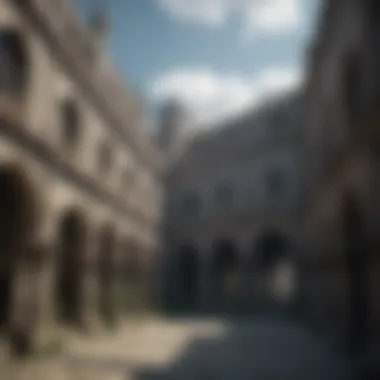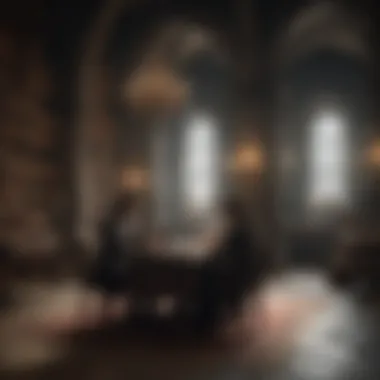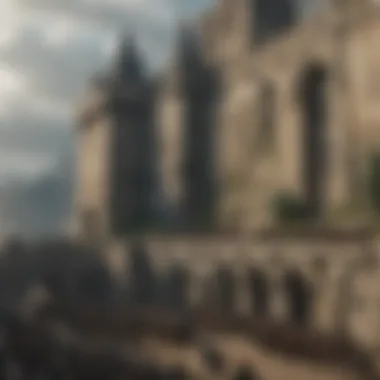The Citadel: Historical Significance in Game of Thrones


Intro
The Citadel stands as a grand edifice within the rich tapestry of Game of Thrones, representing far more than a mere backdrop for the dramatic events that unfurl throughout the series. Its sturdy stone walls and towering spires echo with tales of knowledge, power, and political machinations that permeate the fabric of Westerosi society. Serving as the heart of the Maesters’ scholarship, this institution is a symbol of intellectual pursuit amidst the chaos of a world ravaged by power struggles and war. Yet, its historical significance runs deeper than its architectural splendor; it reflects the complexities of knowledge in the realm of Westeros and the vital role education plays in shaping both characters and events.
In this exploration, we delve into the intricacies of the Citadel, examining its origins, structural beauty, and the profound influence it holds over the narrative and the characters that traverse its halls. Whether a seasoned devotee of the series or a casual observer, uncovering the multifaceted roles of the Citadel offers a richer understanding of the dramatic arcs that define Game of Thrones. Each element of its existence, from the learned Maesters who occupy it to the weighty volumes that line its shelves, contributes to an overarching narrative that intertwines knowledge with fate.
Character Dissections
As we analyze the characters associated with the Citadel, it becomes clear that their journeys reflect the institution’s values and challenges. The Maesters, sworn to serve the realm with their wisdom, are depicted with varying degrees of integrity, ambition, and intellect. Consider characters like Maester Aemon and Maester Luwin, who embody the moral complexity of their roles, each navigating the currents of loyalty and truth within their respective allegiances.
Detailed Analysis of Key Characters
- Maester Aemon: Born from the noble Targaryen lineage, Aemon’s life in the Citadel signifies a retreat from power’s allure, embracing instead a life of scholarly pursuits. His profound wisdom positions him as an essential adviser, often serving as a moral compass within the turmoil of the series.
- Maester Luwin: Acting as a guide for the Stark family in Winterfell, Luwin represents the Citadel’s linkage to the North’s ancient customs and lore. His deep respect for knowledge is matched by his unwavering loyalty to House Stark, exemplifying the delicate balance between personal conviction and duty.
Character Development Throughout the Series
The evolution of these characters not only sheds light on the Citadel’s impact but also on the broader conflicts playing out in Westeros. Characters who in earlier seasons seem resolute in their beliefs face challenges that force them to reassess their priorities. This growth often emerges in moments of crisis or moral dilemma, making their narrative arcs compelling and relatable.
Impact on the Overarching Storyline
Characters tied to the Citadel often serve as catalysts for pivotal shifts in the plot. With their vast knowledge and access to crucial information, their decisions resonate far beyond the stone walls of the Citadel. For instance, Maester Aemon’s guidance delivers wisdom, affecting Jon Snow’s transformation from a Stark illegitimate to a leader in his own right. The interplay between the Citadel’s knowledge and the tumultuous events in Westeros helps articulate the broader message of the series—power often lies in the information held by those who can fathom it.
"Knowledge is power, and the Citadel is its sanctuary in a land where such power can shift the tides of war."
Thus, the Citadel’s significance is multifaceted. It represents not merely an educational institution but a battleground of ideologies, where the front lines are drawn not just in blood, but in knowledge, loyalty, and the thirst for power.
Prelude to the Citadel
The Citadel, located in Oldtown, holds a unique place not just in the lore of Game of Thrones, but also in the broader tapestry of Westeros’s history. This institution serves as a bastion of knowledge and learning, profoundly influencing the fate of kingdoms and the lives of individuals within its walls. As we dive into this exploration, it becomes apparent that understanding the origins and significance of the Citadel enhances one’s grasp of its thematic relevance throughout the series.
Origins and Purpose
The roots of the Citadel trace back to the Age of Heroes, initiating as a humble library and expanding over centuries into the grand educational establishment it is known as today. Originally established to gather and preserve knowledge, its founders aimed to counteract the tumultuous cycles of ignorance and war that plagued Westeros. It is said that the founding Maesters chose Oldtown for its strategic position, a center of trade and culture, to ensure that wisdom could flourish.
Over the years, the Citadel has evolved to become not only a repository of knowledge but also the training ground for Maesters, individuals who dedicate their lives to study and serve the realms. The purpose is clear: to inform and advise the political elite while maintaining a semblance of neutrality. Knowledge was seen as both a weapon and a shield, capable of influencing the Iron Throne’s decisions from behind the scenes.
Significance in Westerosi Society
The influence of the Citadel extends far beyond its physical borders. Within the context of Westeros, it is a linchpin of social structure, representing the intersection of learning and power. Maesters play pivotal roles in noble courts, often serving as advisors, healers, and historians. Their involvement in major events underscores the importance of the Citadel in shaping policies and decisions that impact the realm, whether it’s advising House Stark on the impacts of winter or guiding House Lannister through political machinations.
- Crisis Intervention: During times of crisis, Maesters provide crucial information and counsel, reflecting the Citadel's role as a stabilizing force.
- Cultural Exchange: The Citadel also nurtures a flow of knowledge among various cultures, fostering understanding amid the fragmented alliances of Westeros.
In essence, the Citadel thrives not just as an institution of learning, but as a vital cog in the machinery of the realm, often serving as the best chance for enlightened governance amid chaos. Its existence challenges the traditional notions of power, illustrating how knowledge can be a significant advantage in a world dominated by swords and alliances.
"Knowledge is power; it opens doors as often as it closes them, providing paths that few are willing to tread."
Through this lens, we can appreciate that the Citadel stands at a crossroads of intellect and authority—one that shapes the future of a war-torn land.
Architectural Features of the Citadel
The Citadel stands not just as a repository of knowledge, but as a testament to the architectural ingenuity of its time. Its design embodies both functionality and symbolism, a duality that speaks to its role in the heart of Westeros. Architects and builders didn't merely throw together stones; they crafted a masterpiece that housed the most learned minds of the realm. Understanding the architectural features of the Citadel allows fans and scholars alike to appreciate how it reflects the richness of the lore surrounding the Game of Thrones universe.
Design Elements
When it comes down to the nitty-gritty, the design of the Citadel shows a remarkable blend of form and function. Towering walls, dome ceilings, and intricate stonework aren't merely for show; they signify strength and endurance against the tumultuous tides of history. The Citadel is constructed mainly from local sandstone, ensuring that it melds seamlessly with the natural landscape of Oldtown. The circular design of its major structures promotes unity among the scholars—the maesters—making it clear that knowledge isn’t just gathered; it’s shared and expanded upon.


- Symbolic Towers: The highest tower of the Citadel, known as the Starry Sept, features observatories for studying the stars. This serves a dual purpose; it embodies the quest for knowledge while indicating the maesters' role in guiding the rulers through celestial navigation.
- Great Hall: The expansive Great Hall is where knowledge and power intersect. Long wooden tables made of ancient trees echo the age-old tradition of learning and discussion. It’s not merely a dining area; it’s where treaties are debated and alliances formed.
- Library of the Citadel: Another fundamental design element is the enormous library, home to scrolls and tomes that are not just ancient but often contentious. Here, the architecture doesn't just hold books; it holds secrets, rivalries, and the very blueprint of Westerosi history.
Influence of Geography
Geography plays a significant role in shaping the architectural features of the Citadel. Nestled at the mouth of the Honeywine River, the choice of location wasn’t arbitrary. The Citadel is built on a rise, overlooking Oldtown and the surrounding waters. This natural advantage allows it to serve as both a fortress and a watchtower.
- Natural Defenses: The rivers provide a defense mechanism, deterring potential invaders while also being a vital transport route for scholars and their manuscripts.
- Microclimate: The Citadel also takes advantage of the temperate climate of Oldtown. Its stone structures are cool in the hot summer, which proves beneficial for the preservation of scrolls. The position of the buildings ensures adequate sunlight reaches many areas, enhancing the learning environment.
- Strategic Importance: The geography also contributes to its educational functions, with proximity to fishing grounds and trade routes, allowing for wealth and ideas to flow freely into its halls. Thus, the architecture of the Citadel harmonizes with nature, elevating its standing not only as a place of learning but as a symbol of resilience and adaptability.
The Citadel is a convergence of intellect, design, and the natural world, making it an essential pillar of Westerosi society.
Educational Functions
The Citadel, often seen as the epitome of wisdom and knowledge in Westeros, plays a foundational role in educating those who seek to serve the realm. Its functions extend beyond mere instruction to encompass a broader framework of knowledge dissemination, largely influencing both the political and cultural landscapes of the Seven Kingdoms. The significance of its educational role cannot be overstated, as it acts as a beacon for aspiring minds eager to shape the historical narrative of their world.
The Citadel as a Learning Center
Nestled in Oldtown, the Citadel serves as much more than a fortress; it stands as a sanctuary of learning. Maesters, trained in a plethora of subjects ranging from healing to history, gather here to acquire a vast store of knowledge. This pursuit of learning is not limited to mere book study; rather, it emphasizes a practical approach, veering away from theoretical frameworks.
At the heart of this institution are its extensive libraries, which contain scrolls and tomes that are, to most, invaluable treasures. The unique blend of ancient texts and ongoing research fosters an environment where ideas blossom and innovation takes root. As a result, the Citadel nurtures a culture of inquiry—one that emboldens students to question, learn, and adapt.
The hands-on experience gained by maesters during their training is another essential element of the Citadel as a learning center. With disciplines such as medicine, astronomy, and even ravenry, students are not just passive receivers of knowledge. Instead, they engage with their studies, honing skills that would later serve them in various capacities across Westeros.
"The Citadel is where minds are forged; it is here that understanding blurs the lines between what is known and the mysteries yet to unfold."
Training of Maesters
The rigorous training of maesters at the Citadel illustrates the institution’s commitment to providing a multifaceted educational experience. The journey of a maester begins with the acceptance into the Citadel, where they are immediately immersed in a blend of theoretical study and practical application. Candidates must pass comprehensive tests before earning their chains, each link representing a specific area of expertise such as healing, history, or the arcane art of magic.
Training at the Citadel is a blend of discipline and exploration. Maesters spend years learning not just facts, but also how to apply them to the challenges of the world around them. They master the ancient art of healing, gaining the acumen necessary for tending to ailments that range from the mundane to the mystical.
The selection of a chain link is significant; it denotes both specialization and personal growth. Each student must demonstrate mastery in their chosen fields, signifying that their knowledge is not merely academic but is steeped in practicality and experience. Additionally, the communal aspect of learning at the Citadel fosters collaboration among students, encouraging them to share insights while forming bonds that would influence their future roles in the realm.
In essence, the training of maesters cements the Citadel's status as a crucial educational institution, nurturing the next generation of advisors, healers, and scholars who will wield their knowledge as a guiding force in the turbulent world of Westeros.
The Citadel's Role in Politics
The Citadel stands as more than just an academic hub; it embodies a pivotal role in the political landscape of Westeros. This ancient institution serves as a bedrock for influence, deeply intertwined with the realm's ruling mechanisms. Through its educational functions, it indirectly shapes the policies and decisions of those who occupy the Iron Throne and become the actors of significant historical events. This intertwining of knowledge and politics reveals how learning impacts leadership and governance across the Seven Kingdoms.
Influence on the Iron Throne
The connection between the Citadel and the Iron Throne is intricate and, at times, quite multifaceted. The Citadel molds future courtiers and advisors, embedding them with wisdom and the political savvy needed to navigate the turbulent waters of Westerosi politics. Maesters, trained in the arts of diplomacy, medicine, and lore, often serve at the behest of the ruling houses, becoming essential advisors in courtrooms across the land.
These learned individuals can sway decisions and offer guidance based on historical precedents and their vast store of knowledge. For instance, in the tumult of King Aegon II’s reign, advice from the Maesters became crucial in formulating strategies not just for military might but also for managing alliances and countering insurrections.
Moreover, the Citadel's archives house centuries of knowledge, allowing Maesters to provide counsel that is both historically informed and pragmatically tailored. As no king or queen can afford to overlook the intricacies of those who shape their fate, their reliance on the Citadel’s scholars intensifies.
Connection to Key Houses
The ties between the Citadel and significant houses in Westeros underscore an essential aspect of its political influence. Various noble families maintain symbiotic relationships with the institution. Many noble houses sponsor individuals to enter training at the Citadel, understanding that a well-educated Maester can significantly enhance their standing and resources. This is especially visible in houses like the Tyrells and the Starks, both of which have fostered strong connections with the institution to bolster their influence.
- House Tyrell has commonly supported aspiring Maesters, ensuring access to sage voices in the court of King’s Landing.
- House Stark, with its storied history of pragmatism, also has made sure that their Maesters, such as the well-regarded Maester Luwin, developed strategies that kept Winterfell resilient.
In times of crises, this interconnectedness becomes even more evident. Notable events, such as the War of the Five Kings, illustrate how family alliances often hinge on the advice and expertise of learned Maesters. Their participation in shaping strategies can turn the tide for many. Thus, alliances throughout Westeros can shift dramatically based on who holds favor at the Citadel or who has access to its wisdom.
"In the game of thrones, the power of knowledge cannot be underestimated; the Citadel is both a fortress of learning and a silent architect of political tides."
As we delve further into understanding the Citadel’s political significance, it's clear that this institution remains a cornerstone of power dynamics in Westeros, influencing rulers and shaping the very fabric of governance.


Symbolic Interpretations
The Citadel stands not merely as a physical entity but also as a profound symbol within the Game of Thrones narrative. Its imposing structure represents the confluence of knowledge, authority, and the tumultuous nature of power, echoing through the ages of Westeros. In essence, the Citadel functions as a reminder that wisdom and influence often walk hand in hand, yet they can also lead to grave consequences.
Knowledge versus Power
Within the walls of the Citadel, the pursuit of knowledge often clashes with the wielding of power. The learned maesters, tasked with the noble endeavor of educating themselves and those around them, find themselves entangled in the complex web of various noble houses. This dynamic highlights the age-old struggle that has permeated human history: the knowledge holder's impact on governance and societal structure.
The maesters scribe volumes of history, science, and lore, serving as proficient advisors to the ruling elite. Heroes and villains alike have sought the guidance of maesters like Aemon Targaryen, whose ascent to knowledge does not shield him from the machinations of the political landscape. This interplay raises essential questions about the ethics of knowledge. Just because one possesses wisdom does not guarantee that it will be used for noble causes; rather, it may just as easily be twisted in the pursuit of selfish ambition.
"Knowledge is power, but power brings its own weights, some heavier than books themselves."
The Citadel thus becomes a duality — a sanctuary for learning as well as a battlefield for influence. The observations and records maintained there enable characters like Tyrion Lannister to navigate the treacherous waters of Westerosi politics. The insight provided by a well-informed maester can tip the scales during critical events, emphasizing the notion that while knowledge can be enlightening, it can also be a weapon in a world where power is ever-elusive.
The Citadel in the Context of War
The Citadel's role in wartime is equally enticing. Here, it stands as a beacon of intelligence amidst chaos. The strategic knowledge stored within its archives offers a treasure trove of information. Historical accounts of past wars provide insights that might aid in formulating strategies for future battles. With points of reference from the Dance of the Dragons to the Long Night, the Citadel aids both sides of the conflict through the expertise of its scholars.
Moreover, maesters are often charged with transmitting critical information across Westeros, acting as the lifeline for lords and armies.
- The Citadel fosters diplomacy by acting as a neutral ground where ideas can be exchanged.
- It provides medical expertise during the gruesome toll that wars take on soldiers and civilians alike.
- The blend of scholarship and military acumen transforms the maesters into invaluable advisors who play pivotal roles in wartime decisions.
In summary, the Citadel encapsulates a rich tapestry where knowledge and power interact, illustrating both the potential for enlightenment and the perils of manipulation within world of Game of Thrones. In a realm frequently engulfed in war, the intellectual capital housed within the Citadel provides soldiers and leaders with not just the tools for survival but also potential pathways to greatness or corruption.
Cultural Representation
The significance of the Citadel in the realm of Game of Thrones extends beyond its physical structure. It serves as a powerful cultural icon, encapsulating various themes that resonate throughout the series. The Citadel represents a nexus of knowledge, power, and societal structure, and its portrayal reveals much about the world of Westeros and its values.
The Citadel in Literature
In George R. R. Martin’s works, the Citadel acts as a symbol of wisdom and learning. The vast libraries filled with tomes, scrolls, and ancient manuscripts illustrate the importance of preserving history and knowledge. Characters like Samwell Tarly, who strives to become a maester, encapsulate this theme. Through Sam's journey, readers explore how knowledge can empower individuals to change their fate. His studies at the Citadel not only serve as a personal quest but also reflect broader societal implications about the value of intelligence over brute strength.
Moreover, the Citadel's role in literature emphasizes the contrasting attitudes towards knowledge in different layers of society. While nobles may rely on swordsmanship and lineage, the maesters remind us of the silent strength found in education, often hidden behind stone walls. This duality enriches the narrative, challenging characters and readers alike to reconsider how they define power and success.
Portrayals in the Series
In the Game of Thrones television adaptation, the Citadel is brought to life with meticulous detail. Its towering spires and the ominous shadow they cast symbolize the often oppressive nature of knowledge when wielded improperly. The portrayal of maesters like Pycelle and later characters like Maester Ebrose showcases a nuanced view of those who seek knowledge. They operate within the strict confines of tradition but also reveal deeper motivations and political machinations, blurring the lines between wisdom and manipulation.
The Citadel also functions as a backdrop for pivotal moments in the series, signifying the shift from traditional power structures to a new era driven by knowledge. For instance, the discovery of dragonglass and the understanding of its significance shifts the focus from mere political turmoil to a true existential threat, highlighting how the Citadel’s learning impacts the fate of all Westeros.
“The pen is mightier than the sword,” rings true in Westeros; the knowledge gathered at the Citadel has often dictated the course of history.
Character Involvement with the Citadel
The Citadel stands as a towering beacon of wisdom and influence deeply embedded in the fabric of Westerosi politics and society. Characters associated with the Citadel not only navigate its hallowed halls but also embody its values, philosophies, and conflicts. This section explores how various characters, particularly the Maesters, interact with this prestigious institution, leaving their marks on history. The intertwining fates of these characters and the Citadel illustrate a profound connection that transcends mere academic pursuits; it speaks to the heart of power dynamics in the realm.
Key Maesters and Their Impact
Maesters serve as the living embodiment of all that the Citadel represents—knowledge, service, and diplomacy. Each Maester's journey through rigorous education and examination equips them to advise noble families across Westeros. Consider Maester Aemon, who, despite his ties to House Targaryen, chooses the Night's Watch. His sacrifice reflects a critical turning point in how characters affiliated with the Citadel choose between personal loyalty and broader duties to the realm.
Similarly, Maester Pycelle's long tenure at court showcases how knowledge can be stained by ulterior motives. Positioned within King’s Landing, he manipulates the flow of information, often operating in the shadows to maintain his influence among the power players. His duality, a lore steeped in ambition masked by respectability, offers a glimpse into the darker interactions that can arise when education is subjected to political whim.
In both cases, the Citadel is not just an institution; it is a crucible that shapes the very characters who emerge from its foundations. These Maesters wield their education as both a shield and a weapon, navigating the treacherous waters of court politics while attempting to uphold the high standards expected of their order.
Notable Events Tied to the Citadel


The Citadel has seen events that highlight its impact beyond the walls of its library and laboratories. One significant turning point was the decision to train Jon Snow, who later becomes a pivotal figure in the war against the White Walkers. Jon’s relationship with Maester Aemon and other scholars illustrates how knowledge at the Citadel influences the trajectory of individuals who, in turn, impact the larger world.
Moreover, the Citadel's role during the Hightower Conspiracy—a scheme to unseat the current ruler—sheds light on how Maesters can become embroiled in political machinations. When scholarly pursuits clash with the loyalty to their respective houses, the very essence of their vows is tested. The events leading to the Fall of the Wall, further signify how decisions made by characters deeply rooted in knowledge can lead to monumental shifts in the balance of power that define Westeros.
All in all, the characters tied to the Citadel are more than just beneficiaries of education; they are pivotal in shaping the landscape of power, ideology, and legacy in a kingdom forever under the shadow of conflict. Their decisions resonate beyond the past, informing the present and casting long shadows toward the future.
The Citadel's Decline
The decline of the Citadel marks a pivotal chapter in its storied history, revealing not just the collapse of an institution but also the waning of knowledge and wisdom in a world teetering on the brink of chaos. What once stood as a bastion of learning and enlightenment began to fray at the edges, and understanding the nuances of this decline can shed light on the broader themes of the Game of Thrones narrative. It invites us to reflect on the significance of knowledge as power, as well as the dangers posed by ignorance and dogmatism.
Factors Leading to Decline
A myriad of factors contributed to the fall from grace of the Citadel, each one intricately woven into the tapestry of Westerosi history. For instance:
- Shift in Political Power: As the Iron Throne became more focused on military might and strategic alliances, the ancient wisdom housed within the Citadel began to lose its luster. Power dynamics shifted to favor those who wielded swords over those who wielded scrolls.
- Fragmentation of Knowledge: With the rise of new houses and the burgeoning influence of rulers like Daenerys Targaryen, much of the knowledge that the Citadel guarded was scattered. The unique texts became static relics rather than sources of fresh insight, with novel ideas floundering amidst outdated dogma.
- Internal Strife: Divisions among the maesters themselves played a role in the Citadel's cloudy horizon. Conflicting ideologies and personal ambitions led to rivalries that undermined collaborative efforts to maintain a strong intellectual front. The house of knowledge was becoming increasingly siloed.
- External Threats: The looming threat of the White Walkers and the chaos of power struggles brought about a sort of existential dread. In times of crisis, the importance of empirical knowledge faded as warriors rose to prominence, overshadowing the scholars who once held esteemed positions.
These factors coalesced into a broader narrative arc characterized by the tension between wisdom and power, ultimately leading to the deterioration of the Citadel's esteemed reputation and efficiency.
Myths and Legends of the Citadel's Fall
As the Citadel waned, so too did the myths and legends surrounding its mighty foundation. These tales reveal much about how cultures cope with decline and loss. Among the fascinating narratives:
- The Tale of the Forgotten Scroll: Stories have emerged about a mythical scroll, said to hold secrets that could unite or even save the realm. Yet, legend has it that this scroll made its way into the hands of those who were ill-prepared to wield its power, symbolizing the potential for knowledge to corrupt rather than to illuminate.
- The Last Maester: Some speak of a tragic last maester, who, overwhelmed by the fall and unable to adapt to the upheaval, retreated into a vault deep within the Citadel's depths. It is said he scribbled madly, attempting to record the truth about the realm, only to be lost to time and memory — an echo of the erasure of history itself.
- The Vanishing of the Stars: Local folklore tells of a time when the stars above the Citadel, once twinkling with knowledge and guidance, began to dim. Scholars believed this was a sign of the realm losing its way, paralleling the fraying connection between the ethos of the Citadel and the world around.
These legends are more than just stories; they are conduits for understanding loss, regret, and the fragility of knowledge in a world that seems to upend itself time and again.
In exploring the decline of the Citadel, we engage with the disintegration of ideals and the urgent conversations around knowledge's role in an ever-changing society. This decline serves as a poignant reminder that the past, seen through the lens of history and myth, can shape the ethos of future generations.
Legacy of the Citadel
The legacy of the Citadel stands as a testament to its historical and cultural significance within the realm of Westeros. Beyond its monumental architecture and scholarly pursuits, the Citadel has shaped the trajectory of knowledge and governance in the Seven Kingdoms. By nurturing generations of maesters, the Citadel has influenced the decision-making processes of powerful houses and informed the populace, which in turn, is crucial to events that unfold within the series. The Citadel's role extends far beyond its stone walls; it is steeped in the complexities of lore, tradition, and the unending quest for enlightenment.
Enduring Influence in Westeros
The Citadel continues to be a cornerstone of wisdom in Westeros, demonstrating its lasting impact through the decisions made by its maesters who serve the noble houses. Throughout the storied history of the realm, countless maesters have walked through its halls, each imbued with the knowledge and skills necessary to aid in governance, healing, and education. Whether through the wisdom of Maester Aemon at the Night's Watch or Maester Luwin in Winterfell, the Citadel's influence remains palpable.
- Knowledge Transfer: Knowledge gained at the Citadel is a beacon for many. The art of healing, history, and the mystical arts are just a few areas where their teachings shape policy and the well-being of the populace.
- Political Alliances: The relationships established between the Citadel and various houses have consistently swayed political tides. Maesters often act as advisers, providing counsel based on their training and expansive knowledge.
- Cultural Traditions: The Citadel has introduced practices and customs that have remained prevalent throughout the ages, infusing the culture of Westeros with a reverence for learning and lore.
"He who thinks he knows, does not know." – An adage often uttered in the hallowed halls of the Citadel, reflecting the humility that knowledge should inspire.
Impact on Future Generations
As the world of Westeros evolves, so too does the legacy of the Citadel, impacting future generations in both subtle and overt ways. The legacy is not merely a relic of the past; it serves as an active framework for shaping the future, ensuring that knowledge does not become a lost art.
- Education of Maesters: New maesters continue to be trained, embodying the ethos of the Citadel. They carry with them the skills to advise and heal, perpetuating the cycle of knowledge.
- Inspiring Heroes: The ideological teachings found within the Citadel's library can ignite the fires of empathy and wisdom in the leaders of tomorrow. Characters like Samwell Tarly exemplify the crucial role a maester can play in shaping the future's fate, transforming from a perceived outcast to a pivotal player in the unfolding saga.
- Philosophical Foundations: The conversations held within the Citadel are rooted in questions of morality, duty, and the very essence of knowledge. This ongoing discourse influences how future leaders approach the complexities of governance and ethical dilemmas.
The Citadel is more than an institution of knowledge; it is a cornerstone of civilization in Westeros, guiding not just its past but also its future. Through its enduring influence and the ongoing legacy of its teachings, the Citadel remains a vital player in the narratives that shape the lives and fates of those who inhabit this intricate world.
Culmination
In sum, the Citadel holds a pivotal position in the tapestry of Westerosi history and culture. It serves not just as an institution of knowledge, but also as a powerhouse of influence that shapes the very fabric of the realm. Understanding the importance of the Citadel is essential for appreciating its multifaceted role within Game of Thrones; it is a hub where wisdom is cultivated, and the maesters—guardians of knowledge—come to play a significant part in the political machinations of the Seven Kingdoms.
Reflection on the Citadel's Importance
The Citadel embodies the intersection of learning and power. Its libraries, filled with countless volumes of lore and history, are the repositories of knowledge that impact decisions made by nobility and commoners alike. The training that prospective maesters undergo is rigorous, emphasizing a commitment to knowledge that prioritizes service to the realm. While they are tasked with healing and advising, the deeper layers of their influence often shift the landscape of power dynamics—reflecting a reality in which information can be as potent a tool as a sword in battle.
In recognizing this importance, fans of the series can see how the wisdom cultivated within these walls echoes the challenges characters face. Many characters, from Samwell Tarly to Maester Aemon, straddle the line between duty and personal struggle, illustrating how the pursuit of knowledge can illuminate the darkest choices.
Final Thoughts on its Role in Game of Thrones
The Citadel's function extends well beyond a mere backdrop in the Game of Thrones narrative. It serves as a critical engine for character development and thematic exploration. Through various story arcs connected to the Citadel, viewers witness the subtle yet impactful ways knowledge is wielded. With the power of information comes the responsibility to act wisely, a theme that plays out repeatedly throughout the series.
Moreover, the contrast the Citadel provides against the backdrop of raw political power and brutality in Westeros cannot be overstated. It stands—a stone bastion—against ignorance and chaos, yet is not immune to corruption as seen towards the series' later stages. This duality raises questions about the integrity of learning and its crucial alignment with ethical considerations in governance.



